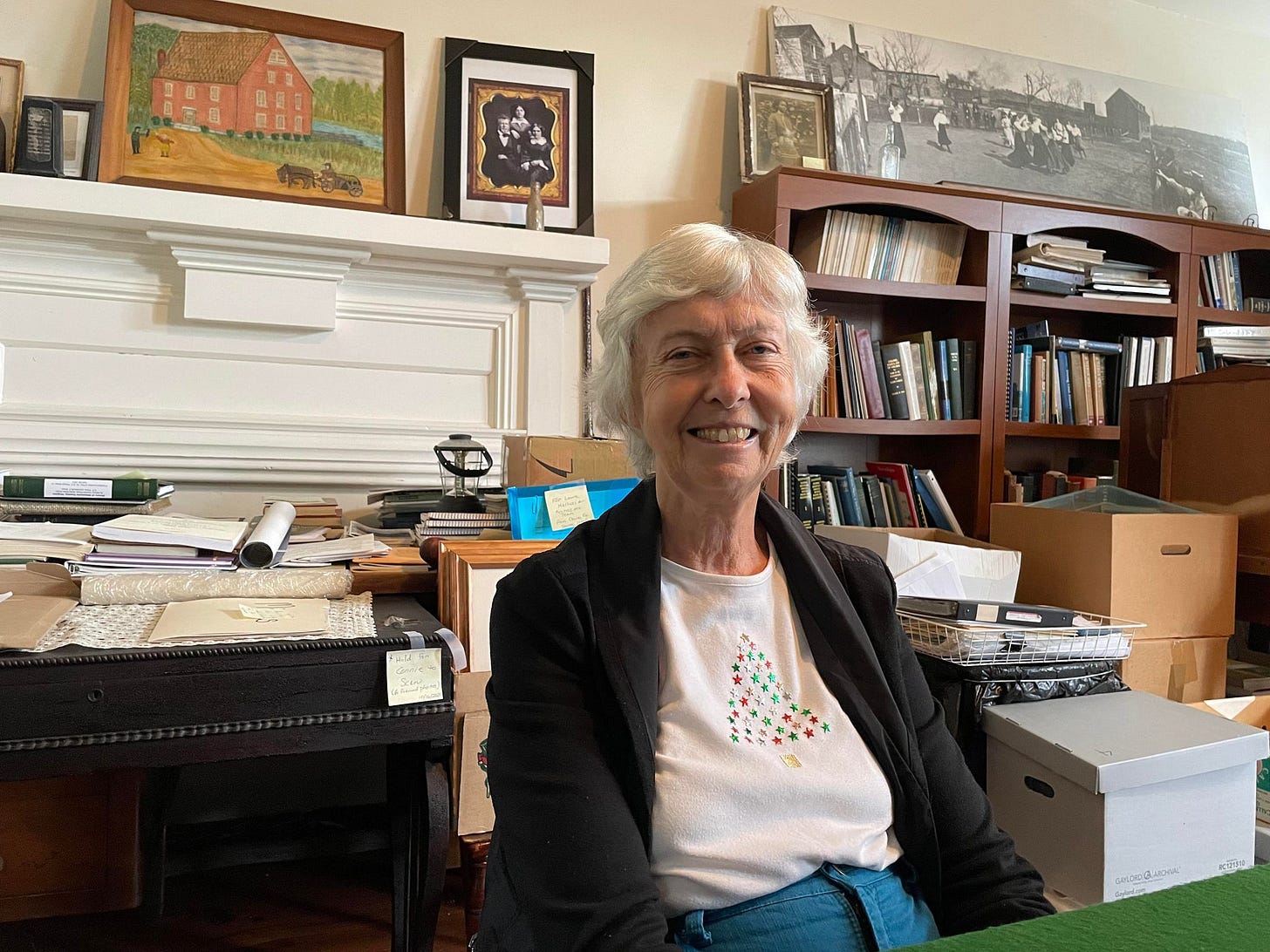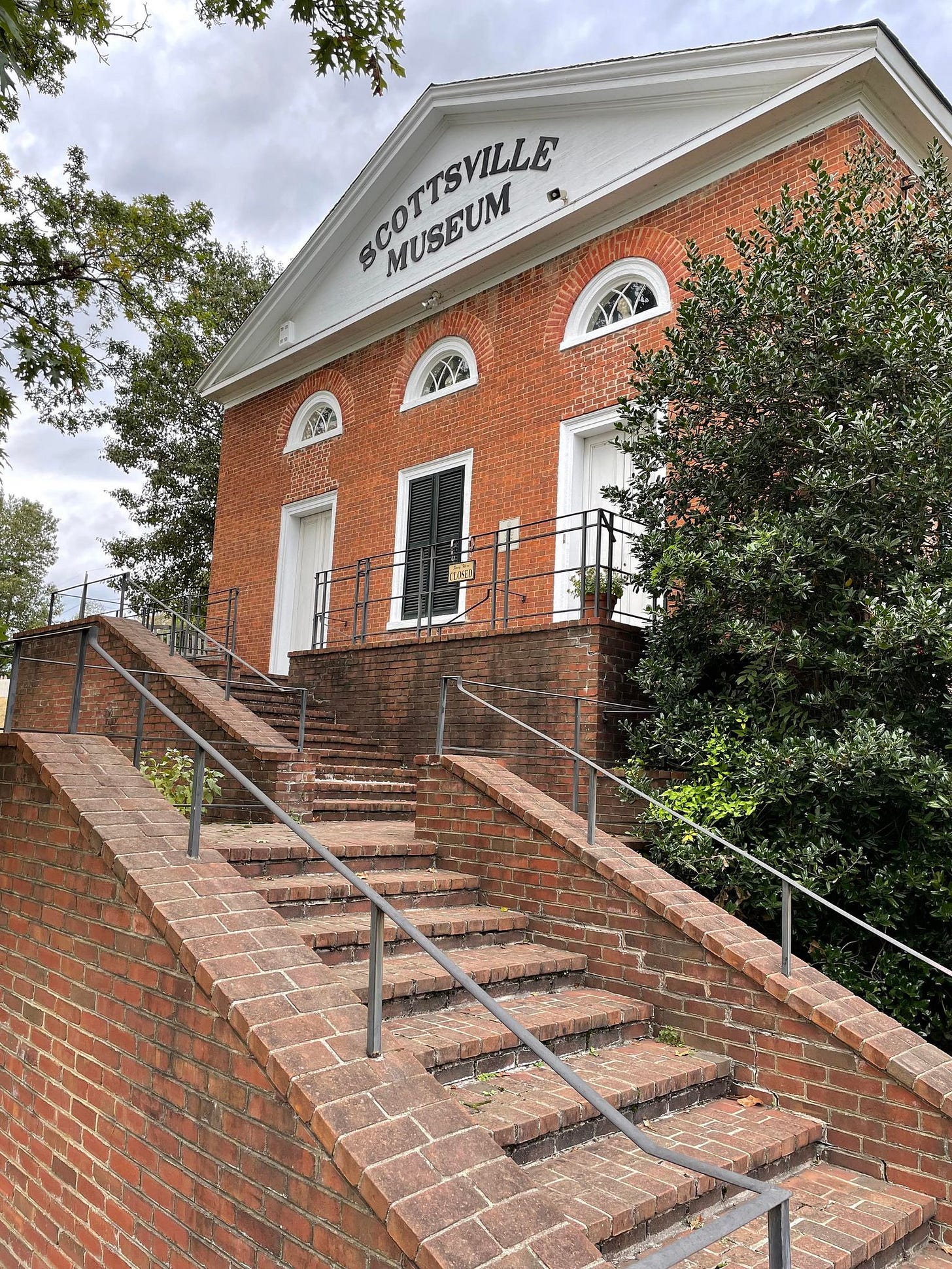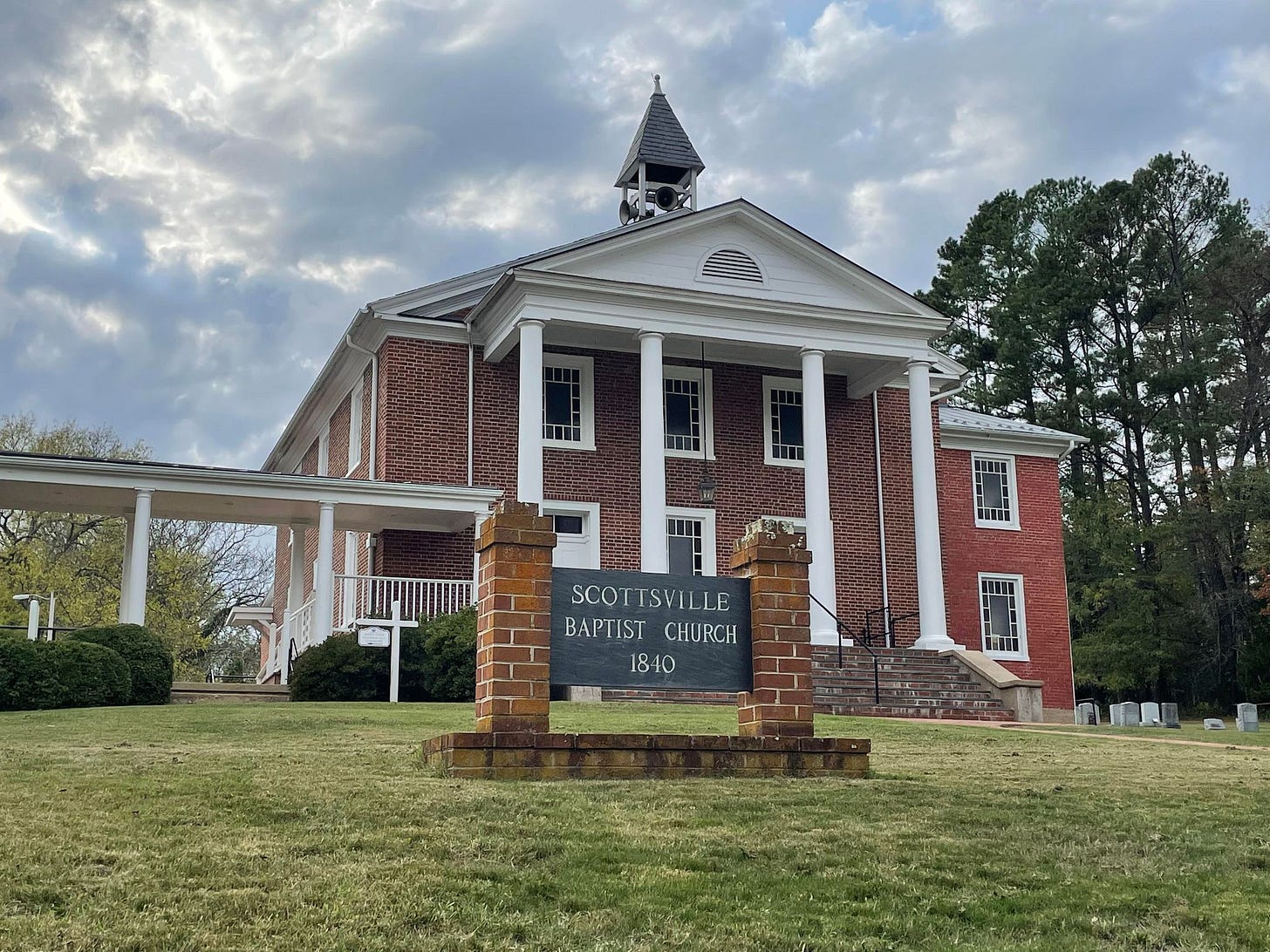I’m so grateful I got to talk with Evelyn Edson, the President of the Scottsville Museum Board.
When Lottie Moon was growing up in Virginia at Viewmont, the Moon family’s plantation, Scottsville was the closest town. Lottie went to church there on Sundays (much to her dismay), and her uncle, Dr. James Turner Barclay, lived there with his family.
If you look at the photo of Edson above, on the right of the mantle, you’ll see a portrait of Dr. Barclay with his wife and daughter, which is also on the museum’s website.
Uncle James plays a significant role in my novel. Plot lines depend on him! And I had some questions. It turns out that Edson was the perfect person to ask about him. She researched and wrote this detailed article about him for the museum’s newsletter.
I met Edson in the building where the Barclays lived, which now serves as an office/storage area for the museum.
The Scottsville Museum is next door. Back in Barclay’s day, that same building was where his church, the Disciples of Christ church, used to meet from 1846 to 1917. It’s only a couple streets down from where Lottie and her family attended church at Scottsville Baptist.
Edson vs. American History
Not only is Edson the president of the museum’s board, of which she has been a member for 12 years, but she is also a professor emerita of history at the local community college, Piedmont Community College in Charlottesville, VA. She is surrounded by American history – literally boxes of it at the museum’s office. But she didn’t always enjoy American history, especially not in grade school. In fact, she tried to run away from it as soon as she could.
“When I went to college, I did not want to take American history because in school, it just was so phoney,” Edson said. “It seemed super patriotic. And anybody could read the history of our country and read there’d been Indian massacres and terrible things. I wanted to study European history. Well, of course European history is just as bad,” she said with a laugh. “But at least it hadn’t been shoved down my throat for 12 years.”
After World War 2, Edson’s parents moved from the midwest to northern Virginia, which she said was as rural then as Albemarle County is now.
“I grew up in Virginia and went to segregated schools my whole life,” she said. “We had a textbook about how the slaves were happy if they had a good master. We all had the wool pulled over our eyes a bit. As a kid, you tend to accept stuff that people tell you.”
But Edson said she was fortunate because even though Virginia schools told their version of the story about a tragically lost era with happy slaves, Edson didn’t buy it – not fully. Because her parents taught her the truth.
“My parents were very clear about racism and things like that,” Edson said. “I would hear stuff at school, and they would set me straight. So I felt like I had an advantage.”
Still, it was a struggle to fight the influence of that story which she heard steadily all the way up through high school. Before she graduated, a teacher gave her a particular book about the Reconstruction Era that was (and still is) essential reading among those with a Lost Cause view of the Confederacy and the antebellum South.
By the time she got to college, Edson was done with all of that and focused her studies on medieval European history — until she collided with a pesky requirement that all students must take at least one American history class.
The things she learned in that one class were very different from what she learned in grade school. One day after class, she asked her professor some questions about the Civil War and Reconstruction in the South. She said the professor then asked her, “What have you been reading?” When she told him, he quickly gave her more resources about that era.
“I forget what he gave me, but I was shocked,” Edson said. “I sort of knew things weren’t right, but it was really startling to see. That was an awakening, but I still didn’t take anymore American history.”
Edson went on to write books about medieval European cartography and started teaching in 1971.
It was inspiring and honestly, refreshing, to talk with someone of that generation who had been given such a warped story about slavery in the American South and yet knew something about it was off. Because Edson consulted varied sources and listened to wise counsel (her parents and college professor), she looked at what people told her was history with a bit more criticism. She studied history as if she actually wanted the truth.
Searching for the truth about Uncle James
In my novel’s earlier drafts, there are plot lines that don’t exist in later drafts. One of them involved Dr. James Barclay and his 12 slaves.
When Lottie was around 10 years old, Uncle James, his wife, and daughter moved to Jerusalem as missionaries. I wanted so desperately to write that he freed those 12 enslaved people before he went to proclaim spiritual freedom among the captives. It would have been the decent, Christian thing to do. He would have set an example for his niece, Lottie. It would have been beautiful, if only it were true.
Throughout this novel writing process, I took creative licenses to bring Lottie’s story to life. I invented a few characters and imagined scenes to connect the dots on Lottie’s life timeline. But everything that I wrote from my imagination was based on research and facts that were either about Lottie specifically or about that era in general.
If I were to claim something as bold and important as Uncle James setting those people free, some wise counsel in my life told me that I needed to be able to back it up with facts (thanks Ashley!).
So I researched the probability of this happening, and I found that it was indeed possible. People sometimes freed their slaves, especially people who were faithful to God, like Uncle James clearly was. That was good enough for me at the time, so I started writing scenes. But it didn’t sit well in my spirit. Even if it was possible, I felt I had to prove it.
I went to the Library of Virginia and talked with very kind and helpful researchers who set me up with an odd-looking machine and some reels of what they called “microfilm.” Nothing in those old census records answered my question. So they told me about manumission papers that former slaves would keep (and guard carefully!) to prove they had been lawfully freed. Those documents were over 200 years old. If I wanted to review them, I needed to request them in advance, keep my backpack and electronics in a special locker, and it wouldn’t hurt to probably wash my hands before touching historical, irreplaceable manumission papers.
Sitting in a beautiful research room with a box of 200 year old documents to look through was an awesome experience. But there was no record of Uncle James freeing his 12 slaves . But there wasn’t a record of him selling them either. So I asked Evelyn Edson what happened to them.
“When [the Barclays] went to Jerusalem, they sold them to raise money for their mission trip,” she told me.
I’m going to leave you some space here to let that sink in…
Edson said the Barclays sold their slaves to people they knew well like the Staples family, which is why I couldn’t find an official record of any transaction. It was between friends.
“Some of them wound up staying in this area, even staying in this house,” Edson said. “The Staples took over this house.”
Staying in this house likely meant staying in the cramped basement.
How to think about slaveholding Christians?
As I spent time researching Lottie’s family, I appreciated how faithful many of them were to follow God and even how calculated they were about what they decided to believe. They didn’t all belong to the same Christian denomination. Instead, the Moons and Barclays looked at God’s Word and carefully came to conclusions about what they believed and chose churches that aligned with those beliefs.
So how did they miss something as obvious as the evils of chattel slavery? How could a Bible-believing Christian sell 12 people to raise money for a mission trip?
I am inclined to believe it’s because they weren’t looking for God’s heart in that area of life. They let the light of the gospel shine only in certain corners. I think this because I see the same behavior today in my own life and in the lives of others. Humans, even ones redeemed by Christ, can be terribly inconsistent in how we let beliefs affect our actions.
Another answer to those two questions is that Christians in that time and place truly believed their system of slavery was good and godly, or at least biblically permissible. I can’t decide if that’s more or less unsettling than my first answer. While there were plenty of Christians, even Baptists, preaching and fighting against slavery, they were mostly up North. In the South, where slaveholders went to church, most pastors either preached for slaves to obey or didn’t preach against it. What else could they do when their main source of tithes depended on slave labor for income? Whether you start with the chicken or the egg, those two supported each other and resulted in a church with a warped view of the Bible and consequently, the world1.
As a young girl learning about slavery in school, it was easy to feel pride. I thought I never would have stood for that slavery nonsense if I were them. But now as I research how Americans Christians, even church leaders, justified slavery, I feel not only horror, but also humility. Throughout my research, humility sat so heavy on my heart.
It should be said that there were passionate abolitionists working to end slavery in America since even before the colonies united against King George. But the majority of Christians who were pro-slavery and otherwise faithful in their walk with God got something about His heart for humanity very very wrong.
Reading books like Reconstructing the Gospel: Finding Freedom from Slaveholder Religion and Institutional Slavery: Slaveholding Churches, Schools, Colleges, and Businesses in Virginia, 1680–18602 made me wonder…
Where are my blind spots?
What in my life and my culture grieves God’s heart but doesn't bother mine?
Like Evelyn Edson said to me:
“What will people 20, 30, 40 years looking back say about [us]?”
This all makes me walk in humility today and plead with God for wisdom, which as we know from Psalm 111:10 and Proverbs 9:10 begins with the fear of the Lord.
While in this season of research, I was blessed to come across Isaiah 58 and read about the kind of pious life that God wants for His people – one that leads to action and “set[s] the oppressed free” (vs. 6). You might enjoy checking it out too.
Also, if you ever visit Scottsville to check out the Scottsville Museum, don’t miss the open air museum across the street and Baines’s Books and Coffee around the corner!
Lottie Novel Update
I’m amazed and humbled to say that I’ve started working on the second-to-last chapter of my biographical historical fiction novel about Lottie Moon’s childhood.
I remember while looking ahead to 2016 on New Year’s Eve, I wrote on a little note card: “I will write a book.” Then I started Googling “how to write a novel.” Now, six years later, I’m looking at a nearly finished manuscript! Praise to God!
I hope that encourages you if you’ve fallen off the wagon with a New Year’s goal. If you miss a day working out, writing, or whatever you’re trying to accomplish — It’s fine; just pick it up the next day. I’m still working on a New Year’s goal from 2016. It’s going to happen! Just not as quickly as I thought.
Thank you so very much for reading. I’d love to hear your thoughts and questions. If there’s something specific about Lottie’s childhood that you’d like to know, you’re welcome to tell me what else you’d like to see on Hindsight History.
Until next month,
Emily
There’s really not room to dive into this here and now, but I may elaborate more on a typical Christian Southerner’s view of slavery in future newsletters.
This book is super scholarly and super expensive. If the price is prohibitive for you, check out your local or state library like I did! The library’s late return fines were much cheaper.







Wow, it sounds like you've done quote a bit of research yourself! Thank you for sharing. I'd love to go visit Lottie's grave one day too and just pay my respects to her. I'll be sure that you know when this book is published. Thanks so much for reading this newsletter! I'm encouraged.
I'm excited to learn of your ambition to write historical fiction. My first experience with this genre was "Killer Angels" by Michael Shaara, which is his story of the battle of Gettysburg.
I have been to Lottie's grave in Crewe, VA. one of her relative's gravestone has a Masonic emblem on it. Now days masons are taboo with Baptist. Speaking of Baptist, slavery was an acceptable institution among them, supposedly its why the Baptist split creating Southern (SBC) denomination and northern (American) denomination. In the south the only churches that believed it to be unChristian were the Methodist and Friends (Quakers). But even the Methodist eventually split into Northern and Southern denominations. In my research one didn't have to be wealthy to own slaves. Many small farmers would have a family of slaves, and the masters would often work side by side with them in the fields. It was comparable to a small family farm owning a tractor and a combine today. In my family tree I have slave owners and I also have a Methodist preacher and Quakers who freed them. Anyway, let me know when you get published.